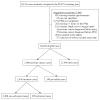Dietary carbohydrate, glycemic index, glycemic load, and risk of prostate cancer in the Prostate, Lung, Colorectal, and Ovarian Cancer Screening Trial (PLCO) cohort
- PMID: 21553078
- PMCID: PMC4470253
- DOI: 10.1007/s10552-011-9772-1
Dietary carbohydrate, glycemic index, glycemic load, and risk of prostate cancer in the Prostate, Lung, Colorectal, and Ovarian Cancer Screening Trial (PLCO) cohort
Abstract
Objective: To evaluate the associations between dietary carbohydrate, glycemic index (GI), glycemic load (GL), and incident prostate cancer in the Prostate, Lung, Colorectal, and Ovarian Cancer Screening Trial (PLCO) cohort.
Methods: Between September 1993 and September 2000, 38,343 men were randomized to the screening arm of the trial at one of 10 PLCO centers. A food frequency questionnaire administered at baseline assessed usual dietary intake over the preceding 12 months. Prostate cancer was ascertained by medical follow-up of suspicious screening results and annual mailed questionnaires and confirmed with medical records. Cox proportional hazards regression was used to model the associations of carbohydrate, GI, and GL with prostate cancer risk.
Results: During follow-up (median = 9.2 years), 2,436 incident prostate cancers were identified among 30,482 eligible participants. Overall, there were no associations of baseline carbohydrate, GI, or GL with incident prostate cancer in minimally or fully adjusted models. There were no associations when the 228 advanced and 2,208 non-advanced cancers were analyzed separately.
Conclusions: Dietary carbohydrate, GI, and GL were not associated with incident prostate cancer in PLCO. The narrow range of GI in this cohort may have limited our ability to detect associations, an issue that future studies should address.
References
-
- World Cancer Research Fund/American Institute for Cancer Research. Food, nutrition, physical activity, and the prevention of cancer: a global perspective. World Cancer Research Fund/American Institute for Cancer Research; Washington, DC: 2007.
-
- Jenkins DJ, Wolever TM, Taylor RH, et al. Glycemic index of foods: a physiological basis for carbohydrate exchange. Am J Clin Nutr. 1981;34:362–366. - PubMed
-
- Wolever TM. The glycaemic index. World Rev Nutr Diet. 1990;62:120–185. - PubMed
-
- Liu S, Manson JE, Stampfer MJ, et al. Dietary glycemic load assessed by food-frequency questionnaire in relation to plasma high-density-lipoprotein cholesterol and fasting plasma triacylglycerols in postmenopausal women. Am J Clin Nutr. 2001;73:560–566. - PubMed
-
- Biddinger SB, Ludwig DS. The insulin-like growth factor axis: a potential link between glycemic index and cancer. Am J Clin Nutr. 2005;82:277–278. - PubMed
Publication types
MeSH terms
Substances
Grants and funding
LinkOut - more resources
Full Text Sources
Medical


